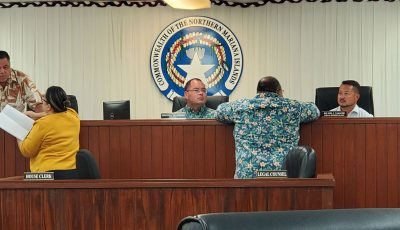Senate OKs bill that prevents casino fraud
A bill that actively prevents abusing financial instruments embedded into the casino glides past the Senate after they passed the bill unanimously with only one amendment.
Senate President Arnold I. Palacios’ (R-Saipan) Senate Bill 20-98 was passed during a Senate session last Monday in the Senate chamber on Capitol Hill with a vote of 9-0.
Prior to passing, Sen. Justo Quitugua (Ind-Saipan), who chairs the Senate Gaming Committee, offered an amendment to further strengthen the legislation, which include only allowing junket operators who are licensed by the Commonwealth Casino Commission to issue gaming debts, or debts incurred from participating in games involving wagers. Quitugua also noted during discussion that the amendments were obtained from the recommendations of the casino commission.
The bill also recognizes and clarifies definitions of financial instruments in casino gaming, such as gaming guarantee, or a promissory note accepted by a licensee as security for extending credit to an identified patron for gaming and casino credit instrument, or any form of writing that evidences gaming debt owed to a licensed person.
The bill clarifies that gaming debt, without the sufficient writings, is unenforceable in any administrative, civil, or criminal proceeding. Debts with proper sufficient writings are valid and are enforceable.
The bill further clarifies that a patron’s claim of having mental or behavioral disorders involving gambling is not a legitimate defense in any civil or administrative action based on or arising out of a casino credit instrument and that it is not a valid counterclaim to any civil or administrative enforcement or collection action.
A person who misuses a credit card to obtain property, services or a valuable benefit from one or more individuals, any governmental entity, a casino licensee, or a corporation or any other entity is guilty of misusing financial instruments.
Such violation also includes using a credit card for obtaining property, services, or a valuable benefit with knowledge at the time of the transaction that the card is stolen or forged; or the card has been revoked or cancelled; or the person using the card is unauthorized by the issuer; or the person using the card has obtained consent from the person in whose name the card is issued by use of a threat of violence or bodily harm, physical intimidation, or physical coercion.
The bill clarified that the guidelines in which people are presumed to have the intent to engage in theft and defraud if certain criteria are met. The presumption is not conclusive but is proof of intent and knowledge which can be rebutted by the drawer or maker, and if payment is not made when due or upon presentment shall immediately begin accruing interests at 12 percent per annum, with payment at full must include the accrued interest.
The bill now heads to the House for action.



























